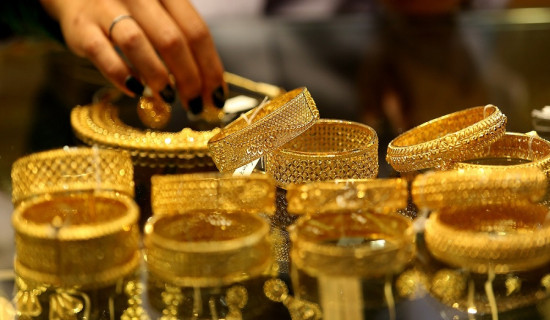- Wednesday, 20 August 2025
Russia, Nepal Eye Deeper Ties
Over the past two years, the West has launched what many call the most aggressive sanctions campaign in modern history against Russia, its economy, its energy sector, its finance, its transport, and even its culture. The goal was simple: isolate, suffocate and force to comply. But the result? The global economy is slowing down, inflation is raging in the very countries that crafted the restrictions, and new centres of gravity are forming outside the orbit of Washington and Brussels.
According to the International Monetary Fund (IMF), global Gross Domestic Product (GDP) growth in 2024 will not rise above 3.2 per cent, with an even gloomier 2.8 per cent predicted for 2025. The World Bank is less optimistic still. And while headlines tend to blame "tariff wars" or "market volatility," it’s becoming increasingly clear: the attempt to politically weaponise trade and finance, especially through sanctions against Russia, is one of the root causes of this mess.
Irony
Here’s the irony. The ones who shouted the loudest are now counting losses. Public debt in France, Italy, Spain, and others has long crossed the 100 per cent GDP threshold. The eurozone can barely hold onto a 0.9 per cent growth rate this year. And next year? Maybe 0.8 per cent, maybe less. Meanwhile, governments are spending billions on energy subsidies - just to contain the damage they themselves caused by cutting ties with affordable Russian gas and oil.
Let’s be honest: trust in the Western-dominated financial system is fading. The dollar and euro no longer feel like safe havens; they feel like weapons. And when money becomes political, people look elsewhere. That’s why BRICS, the Shanghai Cooperation Organisation (SCO), the Association of Southeast Asian Nations (ASEAN) and many other countries are moving toward national currencies and building their own payment systems. Central banks are buying gold instead of euros. Dollar assets? Selling them off. Brazil, Turkey, Israel, Indonesia, the UAE, they’ve all started quietly (and not so quietly) diversifying. Today, gold has overtaken the euro as the second-largest global reserve. That says a lot.
At the same time, Western restrictions on Russian oil exports have backfired spectacularly. A growing "shadow fleet" of tankers keeps oil flowing outside Western control. But when you deny ships access to ports, insurance, and maintenance, don’t be surprised if the ecological risks fall back on your own shores.
Even Western media have started admitting: things didn’t go as planned. Japanese analysts say sanctions hurt Japan more than they hurt Russia. Inflation soared. Markets shook. In Luxembourg, damages from the anti-Russian campaign are estimated at €2.9 billion. In the UK, cutting off Russian energy has cost a staggering £ 62 billion. And these are just the numbers we know. The real, long-term effects - de-dollarisation, new trade routes, and emerging non-Western alliances are only beginning to show.
And here’s where Nepal comes in with quiet wisdom and strategic patience. Unlike many others, Nepal did not fall for the pressure. It stayed true to its sovereign path, rooted in the Panchsheel principles: non-interference, mutual respect, and peaceful coexistence. In a world where it’s increasingly rare to see genuine neutrality, Nepal’s refusal to join the West’s quasi-sanctions regime is not just appreciated - it’s respected. Russia sees this. And we value it deeply.
But beyond neutrality lies opportunity. Nepal and Russia have never had a better moment to reimagine their partnership. Not just as two friendly nations, but as strategic collaborators in a world that’s shifting, diversifying, and refusing to be divided into "with us or against us."
Today, this dialogue is already happening. At the St. Petersburg International Economic Forum (SPIEF), prominent Nepali entrepreneurs and policy influencers sat down with Russian officials to explore real economic projects. Not symbolic gestures, but things that matter: energy cooperation, infrastructure, education, investment. The Eastern Economic Forum (EEF) is another platform where these ideas find traction - far from the sterile corridors of geopolitics, and closer to the future.
Complementary strengths
The truth is, Nepal and Russia have complementary strengths. Russia offers vast scientific and energy potential; Nepal is a rising hub of regional connectivity, culture, and youth engagement. There are openings in trade, tourism, logistics, and educational exchange, and all of them are worth exploring with fresh eyes, free from Cold War era baggage.
While some Western nations still cling to outdated, punitive ideologies, others are waking up to the fact that multipolarity isn’t a threat; it’s a fact. And in this new world, countries like Nepal - independent, balanced, and future-focused - play a crucial role. In short, while others are busy drawing red lines and issuing ultimatums, Russia and Nepal are quietly building bridges. And perhaps, that’s exactly what the world needs right now.
(The author is an ambassador of Russia to Nepal.)















